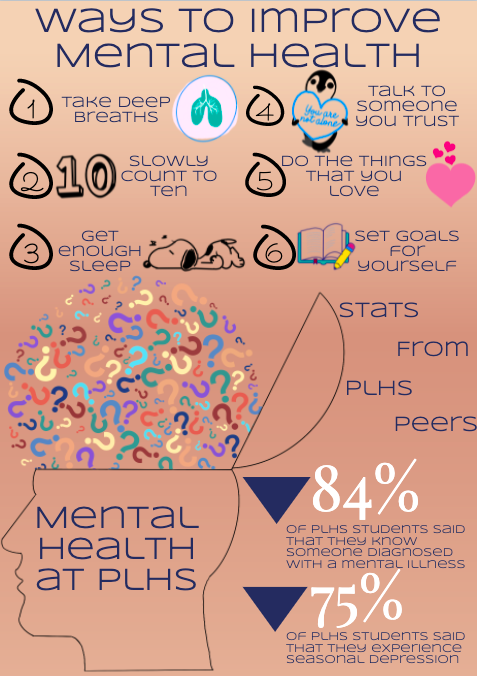Mental Illness Sidekick
Social media is becoming a major contributor to poor mental health for teens today.
The mind is a complex network of different nerves, thoughts, and connections. In some cases, individuals experience a chemical imbalance that can alter the way their brain works.
Most people will experience at least some variation of a mental illness at some point in their lifetime. This could include disorders such as OCD, anxiety, depression, seasonal depression, and many others. It is no surprise that social media is said to worsen these conditions for many people.
Social media platforms capture every part of the human experience, creating unrealistic and simply unattainable standards to reach. Instagram and Tik Tok platforms also can create a negative space for comparison.
“Instagram has definitely gotten to my head at times,” senior Kenna Schneider said. “Seeing girls have features you wish you had, or an item you wish you could afford, can really have you stuck in an area of comparison.”
Social media plays a large role in our lives. You can scroll through the main pages and view a variety of people that seem to have it better than you. This dilemma is, people can not decipher between truth and lies. Celebrities contribute to a lot of false information and false realities posted online.
“With following celebrities, they constantly post pictures with unrealistic edits on their faces and bodies that tend to make us look at ourselves as less than what they are,” Schneider said.
The negative mindset that social media creates for young people can seem never-ending as social media is at the touch of our fingertips and notifications are constantly popping up on our screens. It can be difficult to ignore.
“Social media hurts this generation’s happiness,” Schneider said. “Scrolling through Instagram’s feed and Tik Tok’s for you page can mess with our moods and happiness throughout the day.”
Social media has secretly consumed our daily life more than we know it. It is a form of communication and expressing yourself, even though it may not be the truth.
“I don’t think most people are even aware of the damage social media has on their mental state in the moment of comparison,” Schneider said. “I think we tend to draw ourselves away from the ‘oh I am comparing myself right now,’ because we don’t want to come off as the jealous type, but it’s reality though.”
Social media can make it hard for an individual struggling with any kind of mental illness to take the time alone to get better. It can be a challenge to focus on your own goals when you can see everyone else pursuing theirs.
“As someone who has social anxiety, most days can go from being great to being stuck in a place of panic,” Schneider said. “I struggle a lot to get out of the house and be around large crowds of people and that isn’t always the easiest thing to explain to your friends.”
Even if social media isn’t affecting one’s mental health in serious ways, it has the potential to make one procrastinate on their homework, avoid face-to-face conversations, and distance themselves from real-life experiences. Social media tends to have a way of covering up the real mental health issues people may be dealing with; it’s almost an escape.
“I’ve seen social media affect a variety of people from my best friends to my own mother,” Schneider said.
Our generation and more to come need to learn to use social media in a positive and nonaddictive way. Social media should not consume our daily lives as much as it does.
“I wish social media would all come to an end because it messes with too many people’s mental health,” Schneider said. “To me, this is awful that we are so addicted to a platform that we struggle to have real-life conversations,” Schneider said.
Social media doesn’t seem to be going away anytime soon as we have just entered 2022. However, working to use social media less and using it positively can change the way social media is used. A world without so much comparison can take a weight off our shoulders we didn’t know we had.
Samantha Riggs is a senior and this is her third year on staff. She serves as the Feature editor. Sam also plays varsity volleyball and also participates...






